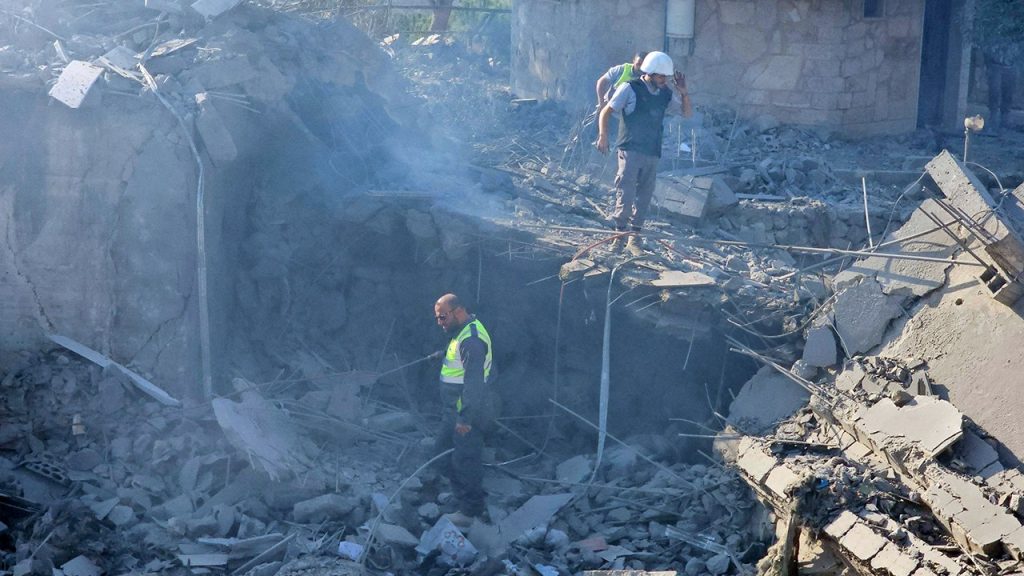Five people were killed in a Hezbollah rocket attack in northern Israel, which occurred one day after an Israel Defense Forces airstrike killed a commander within the terrorist group’s special forces unit. The attack took place in Metula, a town along the Israel-Lebanon border, resulting in the deaths of an Israeli farmer and four foreign agricultural workers, with another foreign worker sustaining serious injuries. The IDF targeted Mustafa Ahmad Shahadi of Hezbollah’s Radwan Forces near Nabatieh, south of Beirut, describing him as responsible for multiple terror attacks against Israel. The IDF aims to degrade Hezbollah’s capabilities in executing terror activities against IDF troops and northern border communities.
Israel’s military has characterized Hezbollah’s plan, known as the ‘Conquer the Galilee’ plan, as a potential large-scale massacre on Israel’s northern border. Shahadi had previously overseen operations during combat in Syria and was involved in terror attacks in southern Lebanon. The IDF has pledged to continue targeting terrorists and Hezbollah commanders to ensure the safety of Israeli citizens. In response, Lebanon’s health ministry reported 19 deaths from Israeli strikes near Baalbek, including eight women. The IDF maintains that these strikes targeted Hezbollah infrastructure and terrorist command centers, with the intent to prevent threats to Israel.
Hezbollah has been accused of abusing civilian infrastructure throughout Lebanon to plan and execute terrorist activities, endangering the lives of Lebanese civilians in the process. Prior to conducting strikes, the IDF issued warnings for residents to evacuate their homes to avoid harm. The IDF Arabic spokesperson, Avichay Adraee, assured civilians that the military’s intention was to target Hezbollah infrastructure, interests, and combat equipment, rather than harm innocent individuals. The conflict between Israel and Hezbollah continues to escalate, with both sides engaging in deadly attacks and retaliations.
As tensions rise in the region, President Trump has reportedly given Israeli Prime Minister Benjamin Netanyahu a deadline to end the Israel-Hamas war by January, should he be re-elected. The situation remains volatile, with both sides carrying out strategic attacks and counterattacks on various targets. Israel’s military strategy involves targeting Hezbollah’s operational capabilities and leadership to disrupt their ability to target Israeli troops and communities. The ongoing violence has resulted in multiple casualties on both sides, with innocent civilians at risk due to the use of civilian infrastructure by terrorist organizations.
The targeted strikes by the IDF are part of a larger effort to dismantle Hezbollah’s ability to conduct terrorist activities in the region. Israel views Hezbollah as a significant threat to its security and aims to prevent future attacks by degrading the group’s operational capacity. The conflict has intensified with both sides engaging in fierce battles and seeking strategic advantages over the other. The international community is closely monitoring the situation in the Middle East, with efforts to mediate and negotiate a ceasefire to prevent further loss of life and escalation of hostilities.
The conflict between Israel and Hezbollah has resulted in significant casualties on both sides, with multiple deaths reported in recent attacks. The IDF continues to target Hezbollah infrastructure and leaders, aiming to disrupt the group’s ability to carry out terror activities against Israel. The volatile situation in the region has prompted international intervention and calls for a ceasefire to avoid further bloodshed. Both Israel and Hezbollah are deeply entrenched in the conflict, with neither side showing signs of backing down. The implications of the ongoing violence extend beyond the immediate casualties, impacting the stability and security of the entire region.













